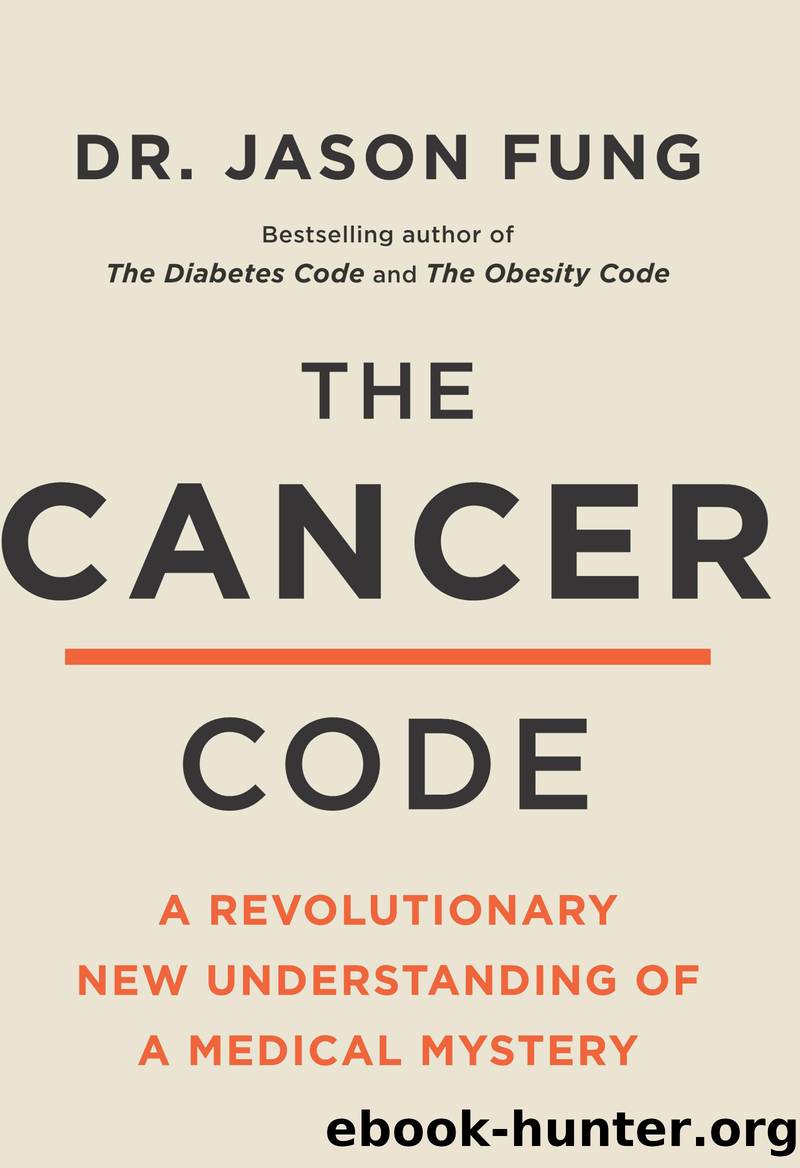The Cancer Code by Dr. Jason Fung

Author:Dr. Jason Fung
Language: eng
Format: epub
Publisher: Harper Wave
Published: 2020-09-24T00:00:00+00:00
From 2005 to 2014, the incidence of all weight-related cancers actually dropped slightly, but a closer look at the numbers tells a vastly different story. This improvement was limited to only one single type of cancer: colorectal. Increased screening with colonoscopy detected and removed precancerous adenomas before they could turn into full-blown cancer, dropping colorectal cancer rates by 23 percent. But excluding colon cancer, the other weight-related cancers increased by 7 percent overall. Cancers not related to weight (like lung cancer) had decreased by 13 percent during that same period. Our steady progress against many cancers is being significantly impeded by the obesity epidemic.42
The news gets even worse for the children of baby boomers, those born in the 1980s and â90s, a generation sometimes called the âecho boom.â Not only are they the heaviest generation in history, but their risk of cancer is higher even at comparable weights, likely due to hyperinsulinemia (discussed in the next chapter). In Millennials, six obesity-related cancers (colorectal, endometrial, gallbladder, kidney, pancreatic, and multiple myeloma) are developing at an age-adjusted rate almost double that for their baby boomer parents.43 For example, those born in 1970 (Generation X) had a 98 percent higher risk of kidney cancer compared to those born in 1950. This seems bad until you realize that those born in 1985 (Millennials) had almost five times the risk!
Cancer in young adults is a warning for future disease burden. If you think itâs scary now, wait until this generation gets older. The obesity epidemic is affecting younger and younger patients, and cancer is following closely behind. For example, the rate of pancreatic cancer is increasing by 0.77 percent per year for those ages forty-five to forty-nine, but for those ages twenty-five to twenty-nine, it is increasing six times more quickly. The youngest people are facing the steepest rises in cancer rates. By contrast, most cancers not related to obesity are decreasing, especially those related to viruses, smoking, and HIV.
If weight gain increases cancer risk, does weight loss lower it? The first animal studies that suggested this possibility were published over a century ago, by 1914 Nobel laureate Peyton Rous. In mice, severely restricting food availability cut their risk of cancer by half.44 In the 1940s, Dr. Albert Tannenbaum, former president of the American Association for Cancer Research, discovered that, astoundingly, carbohydrate restriction alone in mice provided greater protection against cancer than overall calorie restriction.45 He concluded that âtumor formation is dependent on the composition of the diet, as well as the degree of caloric restriction,â a remarkably prescient observation.46 In the Nursesâ Health Study, women who lost ten kilograms or more after menopause and kept the weight off lowered their risk of breast cancer by an astounding 57 percent.
Obesity clearly increases the risk of cancer. Obesity also clearly increases the risk of type 2 diabetes. What is the link? The master hormone of metabolism: insulin.
Download
This site does not store any files on its server. We only index and link to content provided by other sites. Please contact the content providers to delete copyright contents if any and email us, we'll remove relevant links or contents immediately.
How to Be a Bawse: A Guide to Conquering Life by Lilly Singh(7486)
Deep Work by Cal Newport(7083)
The Longevity Diet by Valter Longo(5064)
The Fat Loss Plan by Joe Wicks(4921)
The Four-Pack Revolution by Chael Sonnen & Ryan Parsons(3979)
The Ultimate Bodybuilding Cookbook by Kendall Lou Schmidt(3945)
The French Women Don't Get Fat Cookbook by Mireille Guiliano(3661)
Not a Diet Book by James Smith(3428)
Super Food Family Classics by Jamie Oliver(3418)
Factfulness_Ten Reasons We're Wrong About the World_and Why Things Are Better Than You Think by Hans Rosling(3237)
Turn Up Your Fat Burn! by Alyssa Shaffer(3217)
Self-Esteem by Matthew McKay & Patrick Fanning(3144)
Tom Kerridge's Dopamine Diet: My low-carb, stay-happy way to lose weight by Kerridge Tom(3110)
Body Love by Kelly LeVeque(3059)
The Unbecoming of Mara Dyer by Michelle Hodkin(3047)
Tone Your Tummy Type by Denise Austin(2847)
The Fat Chance Cookbook by Robert H. Lustig(2836)
LL Cool J's Platinum 360 Diet and Lifestyle by LL Cool J(2736)
Men's Health Best by Men's Health Magazine(2603)
